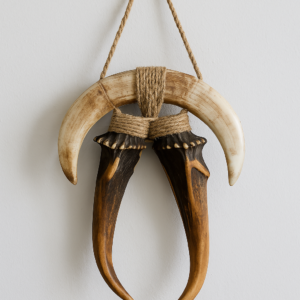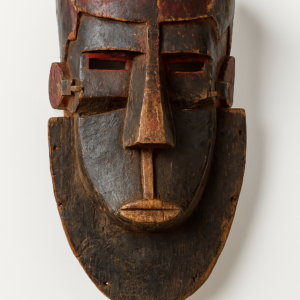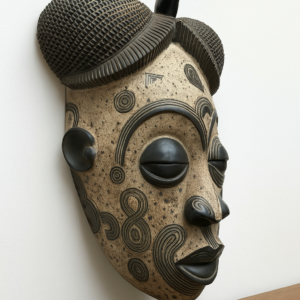“The King Within Power,” meaning “Oba N’Ime Ase” in a combination of Edo and Yoruba linguistic roots, is a regal bronze commemorative head, deeply rooted in the royal traditions of the Benin Kingdom—one of West Africa’s most renowned ancient empires. This piece is more than a sculpture—it is an artifact of legacy, divine rulership, and artistic mastery, representing the fusion of spiritual authority with political and cultural brilliance.
This masterpiece exemplifies the Benin bronze tradition, which dates back to at least the 13th century and reached its peak between the 15th and 17th centuries. The Benin bronzes are celebrated for their incredible detailing, symbolic richness, and the use of the lost-wax casting technique—a sophisticated metallurgical process that allows for striking realism and intricate textural work. The bronze head of an Oba (king) was typically created after a ruler’s death, not as a mere portrait, but as a spiritual vessel imbued with ancestral presence and divine continuity.
At first glance, Oba N’Ime Ase commands reverence. The face is serene yet powerful—full lips, broad nose, wide-set almond-shaped eyes, and a balanced, symmetrical structure communicate authority, discipline, and eternal vigilance. This mask was not designed to replicate a likeness in the Western sense but to idealize the king as a divine and unchanging force, present even in the afterlife.
The most striking feature is the elaborate coral bead regalia meticulously rendered in bronze. The Oba’s high, domed headdress is stylized to resemble the woven coral bead cap worn by royalty—a marker of divine kingship. Coral, in Benin belief, is sacred and associated with the sea god Olokun, who bestows wealth, fertility, and spiritual insight. The dense texture of the headgear, resembling netting and strings of beads, is a visual feast that speaks of nobility, spiritual purity, and sacred authority.
Beneath the face, a wide, flanged collar composed of stacked ridges—again imitating coral bead necklaces—encircles the neck, another iconic symbol of Oba regalia. This rigid stylization of the neck suggests the king’s immovability and dignity. He is not merely a ruler of people but a pillar of cosmic order.
Around the eyes and forehead are subtle markings—scarification motifs that may represent royal insignia, spiritual protection, or cultural identifiers. The cheeks are rounded, the lips slightly parted, and the pupils hollow, giving the mask a piercing gaze, as if eternally watching over the realm and beyond.
Traditionally, bronze heads like this were placed on ancestral altars within the royal palace. Each altar was dedicated to a previous king and maintained by his successor. These heads held ivory tusks that stood vertically from their crowns, inscribed with royal chronicles and myths, and flanked by ceremonial staffs, bells, and offerings. As such, Oba N’Ime Ase is not an idle sculpture—it is a conduit between the living Oba and the ancestors, a guardian of tradition and a link to divine justice.
In today’s world, Oba N’Ime Ase stands as both a cultural treasure and a symbol of resilience. Despite colonial pillaging—including the 1897 British punitive expedition that looted thousands of Benin artworks—these bronzes remain potent emblems of African excellence, sacred sovereignty, and artistic genius.
Collectors, historians, and designers who encounter this piece will be struck by its eternal relevance. Whether displayed in a museum, private collection, academic institution, or interior space, Oba N’Ime Ase anchors any setting with a spirit of authority, dignity, and ancestral wisdom. It is the embodiment of African power unshaken by time.
For Afrocentric interiors or spaces honoring diasporic identity and legacy, this piece brings both gravitas and grounding. It is an object of reflection, honor, and dialogue—inviting all who see it to explore themes of leadership, continuity, and sacred remembrance.





Reviews
There are no reviews yet.